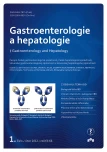-
Medical journals
- Career
Serum levels of infliximab and antibodies to infliximab, clinical using
Authors: L. Gombošová 1; M. Zakuciová 1; E. Barlová 2; L. Novotná 2; E. Veseliny 1
Authors‘ workplace: I. interná klinika, LF UPJŠ a UNLP Košice, 2Oddelenie laboratórnej medicíny, lekárska imunológia, UNLP Košice 1
Published in: Gastroent Hepatol 2012; 66(1): 32-36
Category: IBD: Review Article
Overview
Timely diagnosing, precise treatment and the individual approach are needed for complex management of patients with inflammatory bowel diseases. The goal of the complex and individual approach is to achieve and maintain the remission and to minimize the complications. Tumor necrosis factor alpha (TNF-α) is the key cytokine of the chronic bowel inflammation. Infliximab is the longest used biologic compound. Infliximab reduces TNF-α levels, regulates inflammation and induces remission. Monitoring of the infliximab levels and antibodies to infliximab can contribute to optimalization of the biological therapy and tailoring to individual cases. Loss of response can be also caused by undetectable levels or positive antibodies to infiximab.
Key words:
infliximab – Crohn’s disease – ulcerative colitis – pharmacokinetics
Sources
1. Miheller P, Kiss SL, Lorinczy K et al. Anti-TNF trough levels and detection of antibodies to anti-TNF in inflammatory bowel disease: are they ready for everyday clinical use? Expert Opin Biol Ther 2012; 12(2): 179–192.
2. Ben-Horin S, Chowers Y. Review article: loss of response to anti-TNF treatments in Crohn’s disease. Alimetn Pharmacol Ther 2011; 33(9): 987–995.
3. Danese S, Fiorino G, Reinisch W et al. Review article: causative factors and the clinical management of patients with Crohn’s disease who lose response to anti-TNF-α therapy. Aliment Pharmacol Ther 2011; 34(1): 1–10.
4. Afif W, Loftus EV, Faubion WA et al. Clinical Utility of Measuring Infliximab and Human Anti-Chimeric Antibody Concentrations in Patients With Inflammatory Bowel Disease. Am J Gastroenterol 2010; 105(5): 1133–1139.
5. Klotz U, Teml A, Schwab M. Clinical Pharmacokinetics and Use of Infliximab. Clin Pharmacokinet 2007; 46(8): 645–660.
6. Malíčková K, Bortlík M, Ďuricová D et al. Vliv albuminemie na farmakokinetiku infliximabu u nemocných s idiopatickými střevními záněty. Gastroent Hepatol 2011; 65(2): 70–74.
7. Steenholdt C, Svenson M, Bendtzen K et al. Acute and delayed hypersensitivity reactions to infliximab and adalimumab in a patient with Crohn's disease. JCC 2012; 6(1): 108–111.
8. Steenholdt C, Svenson M, Bendtzen K et al. Severe infusion reactions to infliximab: aetiology, immunogenicity and risk factors in patients with inflammatory bowel disease. Aliment Pharmacol Ther 2011; 34(1): 51–58.
9. Svenson M, Geborek P, Saxne T et al. Monitoring patients treated with anti-TNF-a biopharmaceuticals: assessing serum infliximab and anti-infliximab antibodies. Rheumatol 2007; 46(12): 1828–1834.
10. Bendtzen K, Ainsworth M, Steenholdt C et al. Individual medicine in inflammatory bowel disease: Monitoring bioavailability, pharmacokinetics and immunogenicity of anti-tumour necrosis factor-alpha antibodies. Scand J Gastroenterol 2009; 44(7): 774–781.
11. van den Bemt BJF, den Broeder AA, Wolbink GJ et al. Anti-infliximab antibodies are already detectable in most patients with rheumatoid arthritis halfway through an infusioncycle: an open-label pharmacokinetic cohort study. BMC Musculoscelet dis 2011; 12(12): 1–6.
12. Bendtzen K, Steenholdt C, Ainsworth M et al. Comment on ‘Predicting the response to infliximab from trough serum levels’. Gut 2010; 59(9): 1298–1299.
13. Steendoldt C, Bendtzen K, Brynskov J et al. Cut-off levels and diagnostic accuracy of infliximab trough levels and, anti-infliximab antibodies in Crohn’s disease. Scand J Gastroenterol 2011; 46(3): 310–318.
Labels
Paediatric gastroenterology Gastroenterology and hepatology Surgery
Article was published inGastroenterology and Hepatology

2012 Issue 1-
All articles in this issue
- Journal at the beginning of 66th annual volume: the current state and perspectives
- News from the IBD world
- A word to new subscribers to the journal – members of the Czech Hepatological Society ČLS JEP
- Guidelines for the administration of biological therapy in patients with inflammatory bowel diseases: 2nd edition
- Gastrocolic fistula
- Endoscopic submucosal dissection of early gastric cancer
- Bowel preparation for colonoscopy
- Václav Havel – a look back
- What did Václav Havel for us and what can we do for his heritage?
- Serum levels of infliximab and antibodies to infliximab, clinical using
- The role of vitamin D for inflammatory bowel diseases
-
How important is the multidisciplinary approach to the colorectal cancer patients?
The 1st National Colorectal Cancer Congress/1. Postgraduate Course of SGO report - New standards in Crohn’s disease treatment
- Recollection from Gastrofórum
- Low serum deoxyribonuclease I activity is associated with antiTNF-alpha induced skin adverse events in patients with inflammatory bowel disease
- Matrix metalloproteinases and their inhibitors in correlation to proliferative and classical tumour markers during surgical therapy of colorectal liver metastases
- Gastroenterology and Hepatology
- Journal archive
- Current issue
- Online only
- About the journal
Most read in this issue- Bowel preparation for colonoscopy
- Gastrocolic fistula
- Serum levels of infliximab and antibodies to infliximab, clinical using
- The role of vitamin D for inflammatory bowel diseases
Login#ADS_BOTTOM_SCRIPTS#Forgotten passwordEnter the email address that you registered with. We will send you instructions on how to set a new password.
- Career

